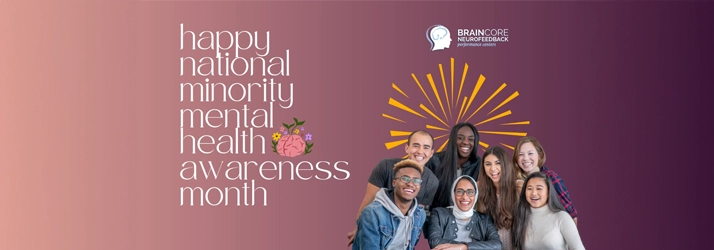Minority Mental Health Awareness Month In Duluth GA

Breaking the Silence: Advocating for Mental Health in Communities of Color
July is National Minority Mental Health Awareness Month, a time dedicated to shedding light on the unique challenges faced by people of color when it comes to mental health. As a member of this community, I understand firsthand the complexities of navigating a world that often overlooks or dismisses our emotional well-being. It's time to break the silence and prioritize mental health within our communities.
Historically, mental health has been a taboo subject, particularly within marginalized groups. There's a deep-rooted stigma surrounding seeking help, fueled by misconceptions, fear, and cultural expectations. We've been conditioned to believe that strength equates to stoicism and resilience to enduring pain without complaint. This toxic mindset has prevented countless individuals from getting the support they desperately need.
The truth is that strength lies in acknowledging our vulnerabilities and taking steps to heal. It's about recognizing that mental health is just as important as physical health. At BrainCore of Duluth, we maintain that our patients deserve to live fulfilling lives free from the shackles of emotional turmoil.
Advocating for mental health In Duluth GA
For people of color, the intersection of race, culture, and socioeconomic status can exacerbate mental health challenges. Systemic racism, discrimination, and microaggressions can take a toll on our psychological well-being. We carry the weight of historical trauma, and the constant battle against prejudice can be exhausting. It's essential to create safe spaces where we can openly discuss these experiences without fear of judgment or invalidation.
Advocating for our mental health is a crucial step towards healing and empowerment. It means educating ourselves about mental health conditions, understanding the available resources, and challenging harmful stereotypes. It's about prioritizing self-care, building strong support systems, and seeking professional help when necessary.
As advocates, we can also play a vital role in supporting our loved ones. Learning to recognize the signs of mental distress in family members and friends is essential. Offering empathy, compassion, and encouragement can make a world of difference. We can also help to reduce stigma by openly discussing mental health and sharing our own experiences.
I was grateful for the opportunity to speak at the Mocha Matters division of the Spectrum Autism Support Group in Duluth, GA, this month. Sharing information about brain health and answering questions about neurofeedback therapy was incredibly rewarding. It's through open dialogue and education that we can empower individuals and families to take control of their mental well-being.
It's important to remember that healing is a journey, not a destination. There will be setbacks, but progress is possible. We must celebrate our resilience and progress, while also acknowledging the challenges that lie ahead.
National Minority Mental Health Awareness Month is a powerful reminder that we are not alone. By coming together as a community, we can create a supportive environment where mental health is prioritized and destigmatized. Let's break down barriers, challenge misconceptions, and build a future where everyone has access to the mental health care they deserve.
Remember, your mental health matters. You are worthy of happiness, peace, and well-being. Don't hesitate to seek help, and encourage others to do the same. Together, we can create a brighter future for ourselves and generations to come.

